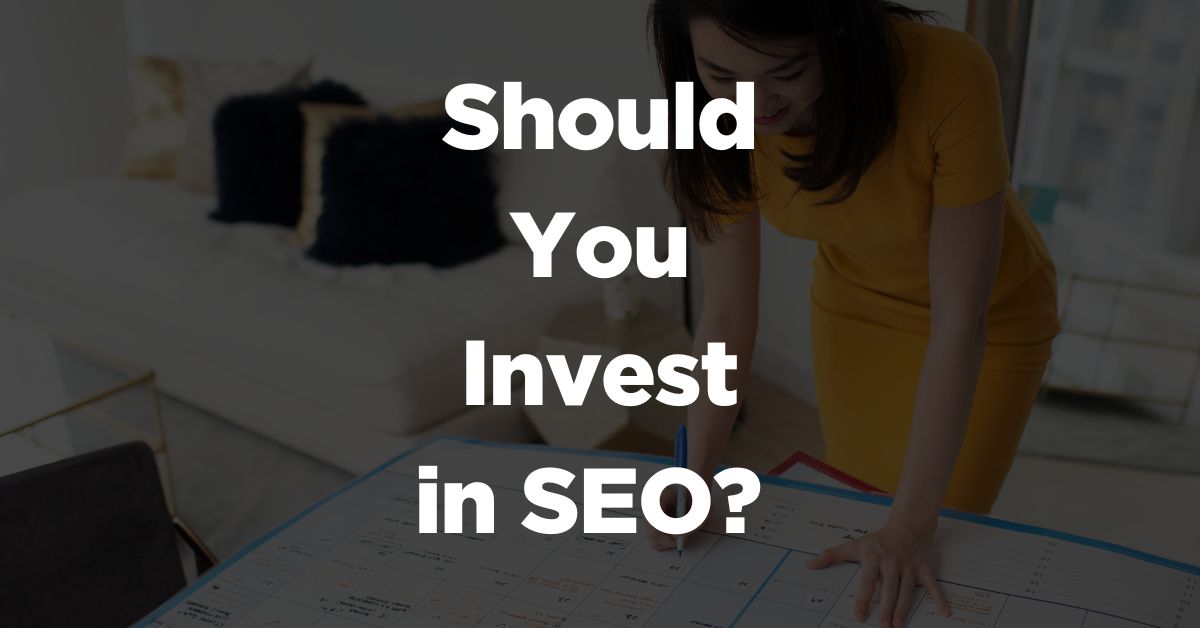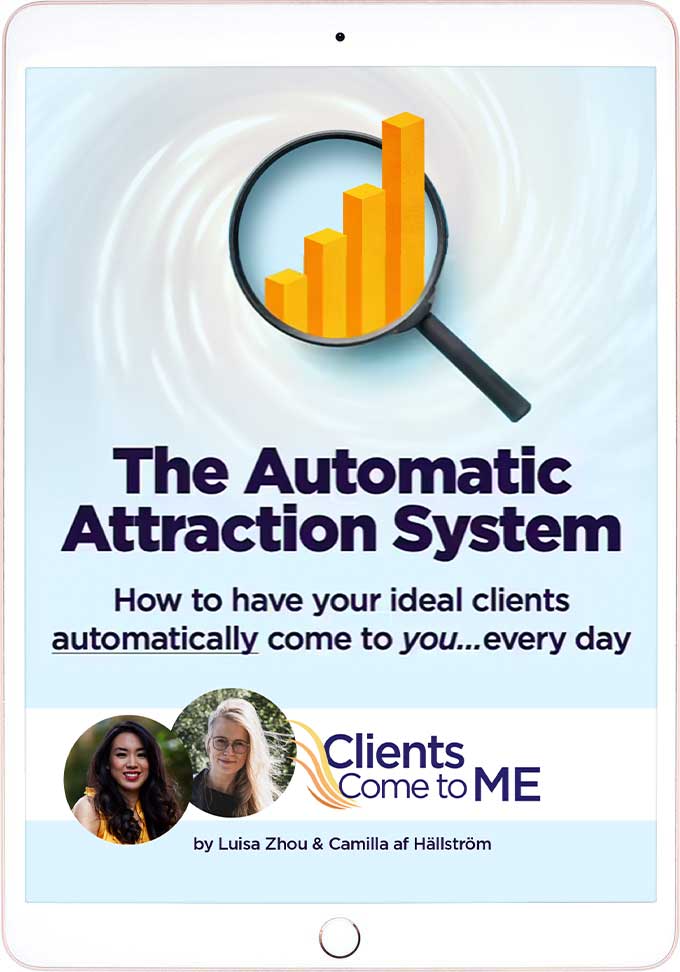Should you invest in SEO?
You’re in the right place. In fact, I made SEO a multiple six-figure marketing channel in just two years after I made the decision to invest in it.
And in this guide, I’ll show you how YOU can get more clients with SEO.
Read on!
You’ll learn:
- What is SEO?
- Should you invest in SEO?
- What’s the average SEO ROI?
- How much should you invest in SEO?
- What type of SEO experts should you work with?
- When should you invest in SEO?
- Should you invest in SEO or PPC?
What is SEO?
Search Engine Optimization (SEO) is a digital marketing strategy that helps search engines find your content and rank.
By using SEO to optimize your website to rank for relevant searches, you can drive organic traffic to your business. So, people come to your website when they search for queries related to your business and click on organically ranking content.
That’s opposed to paid ads, which is search (or social) traffic you pay for.
But how do search engines rank your content?
Search engines use phrases called “keywords” to identify quality content. You can add these keywords in strategic places in your content.
Take my website.
It ranks for keywords like “coaching business” so that people who want to build a coaching business find me.
From there, they might buy my flagship course, Employee to Entrepreneur. By building up my organic traffic in this way, SEO is now a multi-six-figure marketing channel for my business.
The 4-Step Automatic Attraction System
for attracting more clients daily... without paid ads, social media, or "hustle"!
All because I optimize my website for the right keywords.
When people search for keywords relevant to your business, they’re more likely to convert than if they see your business in an ad. In fact, 14.6% of leads from search engines buy from you versus 1.7% from paid ads.
So how can you improve your SEO ranking?
Google has over 200 ranking factors. And they’re constantly being updated.
To get started, a few steps to building your SEO include:
- Doing keyword research: Use tools like Google Keyword Planner to identify low-competition keywords in your niche. Then, create blogs to target each keyword.
- Optimizing your content: Write engaging content and insert keywords strategically to optimize it for the Google algorithm. (There are more things that go into your SEO strategy – check my guide here on how to get more traffic.)
- Building links from other websites: Backlinks are one of the most valuable ways to build your website’s authority. The higher the authority, the higher the rank. You can build backlinks through SEO strategies like guest posting or podcasting.
Want to learn more about the actual steps to implement SEO?
Check out this video:
Is it worth investing in SEO?
So now you know what SEO is. But why is SEO important for your website?
As a long-term investment, SEO can potentially have a massive ROI for your business.
That’s why spending on SEO from 2008 to 2020 has grown over 7x from $11.5 billion to just under $80 billion.
But even though SEO is a proven marketing channel, 56% of small businesses still don’t use SEO or aren’t sure if it’s part of their marketing strategy.
I get it – SEO can feel both overly complex and not like a totally “secure” marketing channel.
Contrast it to ads, where you can get to a 2:1 ROI fairly quickly, while SEO takes time to build.
If you haven’t started using SEO yet, listen up.
Here are the reasons to invest in SEO.
1. Increase your traffic
If you want your website to get found online, you need traffic.
The average business drives 53% of its traffic through organic search.
And SEO tends to bring better quality traffic than paid ads because people are searching for information about your services specifically versus randomly coming across a website on social media.
So, ranking for the keywords relevant to your products and services means that you’ll reach more potential customers.
The thing is – you don’t even need that much traffic to get your first clients.
In fact, my first sales came in when I had about 2,000 site visitors from Google.
And once you have that traffic, your business will be far more profitable in the long term.
What do I mean?
That’s what we’ll look at next.
2. Set your business up for long-term success
In short, SEO helps you scale.
How? Well, SEO is a traffic source that works even when you’re not actively working on it.
Let me explain.
Once your SEO efforts start to see results (AKA your articles start ranking on Google), you’ll continue getting traffic from Google. Without you having to do anything about your articles.
(That said, if you never update them, they’ll at some point become outdated and lose their traffic. But we’re talking about yearly updates.)
If you compare SEO traffic to ads, the moment you stop paying for ads, you lose your traffic. Plus, your ad spend eats up your profit…really fast.
I should know because I used ads for a long time to scale my business.
But I wanted a more sustainable traffic source for my business. With SEO, I was able to get far more predictable and profitable traffic and sales.
3. Become more profitable
The ROI of SEO varies across industries.
However, one figure by the marketing agency Terakeet puts the ROI of SEO at 250%-1,200%.
Why is it so profitable? Simple. You don’t pay for your traffic.
With paid advertising, you’re paying for each impression or click on your ad.
Over time, that becomes less and less profitable as you scale your business.
Investing in SEO is not free – but it’s one of the most profitable traffic sources.
As your traffic builds over time, so do your profits.
4. Build a sustainable business
With social media, you’re creating huge volumes of content to attract customers.
The cost? You need to “hustle” every day to get in front of your ideal audience.
With SEO, people come to you. So it’s a lot more sustainable than most other digital marketing strategies.
This is why I started investing in SEO.
Ads were great at getting traffic quickly in the beginning, but I wanted to scale my business – without the daily grind.
Sure enough, I knew I had to be in it for the long term.
After all, SEO is a long-term investment. But I quickly saw that the quality of leads who came in from our SEO traffic far surpassed our other marketing channels.
And as sales started dropping in without me having to constantly think about ad creatives or social media content, I also saw just how much better off (and valuable!) my business would be.
Sure enough, a few years in, my traffic has scaled while I work no more than a few hours a day on my business.
There aren’t many digital marketing strategies that can do that.
5. Build your brand
Working on your SEO builds your brand.
Think about it:
If people consistently see YOUR website in organic search results, they start seeing you as one of the “go-to” names in your industry.
What’s more, the expertise you offer in your content makes people trust your brand.
That’s what happened to me…
People started seeing my content all across Google.
You don’t even need to invest in a huge amount of content to reach that level. I started out with one to two blog posts per month.
In fact, you probably shouldn’t push out more content than that before you have the resources to create really great content at scale.
That leads me to the next point… Your user experience.
6. Improve your user experience
What’s the most important metric for Google?
How well people find things on Google’s platforms.
And so they want to rank websites that help their users find what they need as fast as possible.
That’s why your user experience is so important.
Without a good UX, you’ll lose your users…and your rankings.
How can you improve your UX, though?
A few examples:
- Content structure: If your content has clear headings with keywords, it’s easier to read. Content with images is also easier to digest and understand.
- Site structure: A website with a messy site structure is hard to navigate. So visitors are less likely to find what they’re looking for.
- Page speed: A study showed that content with a longer page speed than five seconds had a 90% higher bounce rate than page speeds of one second. (The bounce rate is the average percentage of site visitors that leave the page right after clicking.) So improving page loading speed keeps your audience on your site.
That’s why you should really think about how you can improve your website and make it easier for users to interact with.
Ultimately, you improve your bottom line in the process.
Speaking of ROI…
What is a typical ROI for SEO?
To be fair, the ROI of SEO depends on your industry, where you are with your business right now, and your products and services.
Profitworks shares that the ROI of their SEO campaign was 275%. Specifically, it generated $2.75 for every dollar spent.
The 4-Step Automatic Attraction System
for attracting more clients daily... without paid ads, social media, or "hustle"!
I would personally look for a ROI of 3-4X your investment.
That’s the typical ROI my growth agency, Zalstrom, helps our clients attain when they’re just starting out with SEO.
But how do you calculate the results from your SEO campaigns?
Here’s the formula:
SEO ROI = (value of conversions – cost of investment) / cost of investment
You can use an ROI calculator to help you figure it out.
Note: SEO ROI doesn’t come immediately.
SEO takes time to build up – it can take 3-6 months or even more to see results.
After all, it’s a long-term strategy.
How much should you invest in SEO?
So you want to start investing in SEO. What’s a good amount to invest?
It depends on your business, your budget, and your goals.
Let’s talk about average numbers.
Cheaper SEO content writers or specialists can cost as little as $200-$500 a month.
But the truth is, it’s very hard to do high-quality SEO work with that monthly budget.
For this rate, you’ll likely only get basic SEO content with mid-range keyword research.
Good SEO agencies cost $1.5k to $100k+ per month, depending on the size of your business.
You might want to hire an in-house SEO if you have a large company.
The average SEO manager makes $101,515 per year, according to Glassdoor.
So a good salary for an SEO specialist (depending on their level of expertise) is between $50k-$100k+.
But what if you’re a small business owner or solopreneur who wants to invest in your SEO?
You can also opt for online courses to learn SEO content marketing yourself.
For example, my own course, Clients Come to Me, helps small businesses use SEO to attract clients and automate their sales in a sustainable way. (AKA you learn a doable system for growing your organic traffic and getting predictable sales.)
Once your SEO process is profitable, you can delegate to an SEO writer or agency.
So should you go for a writer, agency, or in-house SEO? We’ll cover that next.
How do you invest in SEO?
There are three ways to invest in SEO for your business:
- SEO freelancers: From writers and editors to technical SEOs, there are plenty of freelancers offering their SEO services. They tend to be the cheapest option, but the quality of the work ranges from freelancer to freelancer. But, you’ll have to spend time finding the right freelancer for your business.
- SEO agencies: SEO agencies typically offer “all-in-one” packages. That said, you do need to vet SEO agencies carefully.
- In-house SEOs: This is an SEO specialist that you hire to be part of your team. They can also manage outsourcing to freelance writers and editors.
Which alternative is best for you?
It depends.
Working with agencies can be more effective because they work with so many different client and learn across industries. Plus, they have more specialized talent than most in-house SEO teams.
That means better results for you in the long term.
A larger organization typically requires an in-house team. If you have a small business with a limited budget, a freelancer can help get you started.
Or, you can take the DIY approach. That said, you DO need to learn SEO and if you want to avoid trial and error, I recommend that you first learn from people who’ve already done it.
When should you invest in SEO?
Even though SEO is a profitable and sustainable marketing channel, it’s not for beginners.
Here’s why:
SEO marketing takes time.
If you’re trying to attract your first customers, you should focus on faster marketing strategies to make your first sales.
For example:
- Networking
- Social media
- Paid ads
- Podcasts/guest posting
These strategies are more likely to get your first customers through the door.
I talk more about effective marketing strategies in this video:
Because SEO can take 3-6 months to see results (or longer in some industries), it’s not a good idea for new businesses.
Once you have a solid source of clients that can cover the SEO costs, it’s time to invest.
In short, you know you’re ready when:
- You’re making enough consistent income to cover SEO costs
- You’re committed to the process – remember SEO takes time
But if you want faster results, PPC could be a better option for you.
Let’s compare them.
Should you use SEO or PPC?
Here’s the thing: both SEO and paid ads work.
If you have the budget, SEO can help PPC and vice versa.
However, if you’re just starting out and don’t have the budget for both, PPC can be easier for getting quick results.
It’s fast and effective. But in the long term, it’s not as profitable as SEO.
Ad prices are going up due to increased competition. So the ROI decreases.
SEO isn’t a free marketing strategy – even if you do it yourself, it still has an opportunity cost.
But you can potentially build up a really strong ROI that sustains your business.
This is because the organic traffic you generate from SEO can drive results for years to come.
For example, our clients in our agency, Zalstrom, have replaced their ad traffic with SEO. Take our client Jasmine:
“When we started working together, we were doing well and we were getting consistent sales from Facebook ads. But I was also getting frustrated with ads because things were changing and they were never consistent enough. I didn’t like that inconsistency. That’s when I knew we needed to diversify our traffic sources. Fast forward to today, we get consistent monthly sales from search engines.”
Next steps
So should you invest in SEO?
If you want a profitable and predictable business, then yes.
You have a couple of alternatives…
The 4-Step Automatic Attraction System
for attracting more clients daily... without paid ads, social media, or "hustle"!
If you want to outsource your SEO to the experts, consider our done-for-you content services at Zalstrom.
Or, if you’re ready to learn SEO and scale your business, sign up for my free on-demand class to learn how to attract ideal clients automatically.
Read more:
How to Grow Your Blog: The Best Strategies








